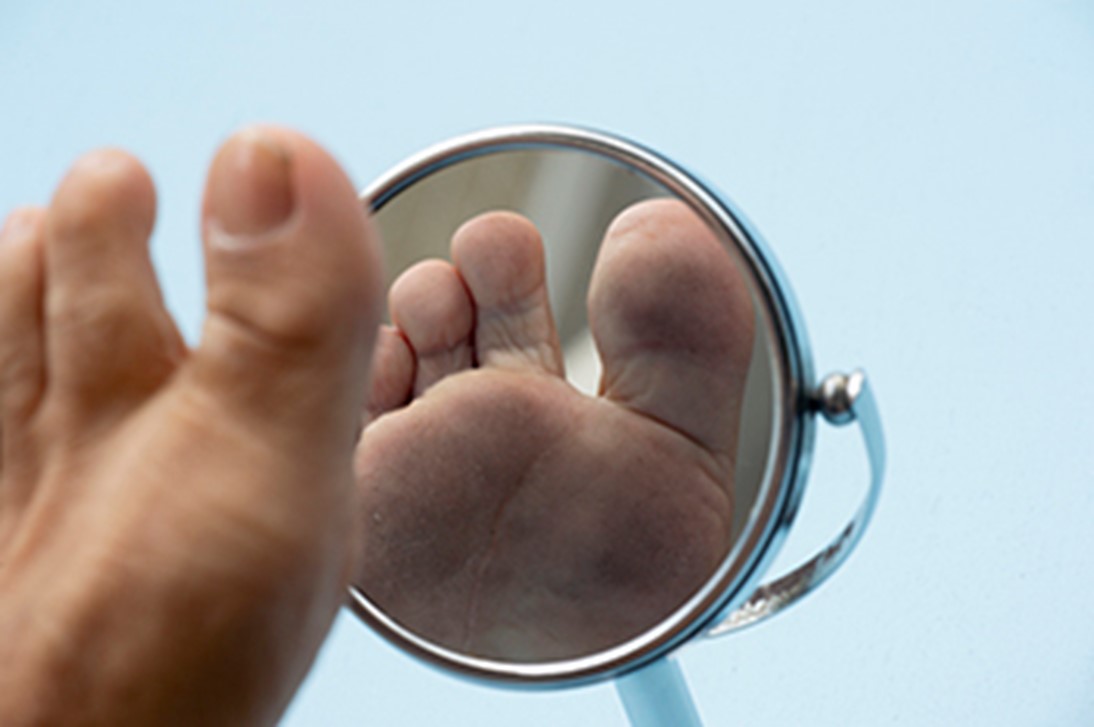 Open wounds on the feet are injuries that break the skin's surface, leaving underlying tissue exposed. Each type of open wound has distinct signs and characteristics. Abrasions, commonly referred to as scrapes, occur when skin on the foot experiences superficial damage from rubbing against a rough surface. Lacerations are cuts caused by sharp objects, which may vary in depth and severity depending on the force of the injury. Puncture wounds in the foot occur when a sharp object penetrates the skin, creating a small hole that can lead to deep tissue damage and infection if not properly treated. Avulsions, which often result from traumatic injuries in feet, involve the tearing away of skin and tissue from the body. Surgical wounds are intentional incisions made during surgical procedures. These open-foot wounds require careful monitoring and care to prevent complications during and after the procedure. Diabetic ulcers are open wounds often found on the feet of diabetics, resulting from poor circulation and nerve damage. Regardless of the type, appropriate wound care can decrease risk of infection in the foot and promote healing. If you're experiencing challenges with open wounds, it's suggested to consult with a podiatrist for effective treatment and management, reducing complications and supporting a successful recovery.
Open wounds on the feet are injuries that break the skin's surface, leaving underlying tissue exposed. Each type of open wound has distinct signs and characteristics. Abrasions, commonly referred to as scrapes, occur when skin on the foot experiences superficial damage from rubbing against a rough surface. Lacerations are cuts caused by sharp objects, which may vary in depth and severity depending on the force of the injury. Puncture wounds in the foot occur when a sharp object penetrates the skin, creating a small hole that can lead to deep tissue damage and infection if not properly treated. Avulsions, which often result from traumatic injuries in feet, involve the tearing away of skin and tissue from the body. Surgical wounds are intentional incisions made during surgical procedures. These open-foot wounds require careful monitoring and care to prevent complications during and after the procedure. Diabetic ulcers are open wounds often found on the feet of diabetics, resulting from poor circulation and nerve damage. Regardless of the type, appropriate wound care can decrease risk of infection in the foot and promote healing. If you're experiencing challenges with open wounds, it's suggested to consult with a podiatrist for effective treatment and management, reducing complications and supporting a successful recovery.
Wound care is an important part in dealing with diabetes. If you have diabetes and a foot wound or would like more information about wound care for diabetics, consult with one of our clinicians from The Footcare Centre. Our podiatrists will assess your condition and provide you with quality foot and ankle treatment.
What Is Wound Care?
Wound care is the practice of taking proper care of a wound. This can range from the smallest to the largest of wounds. While everyone can benefit from proper wound care, it is much more important for diabetics. Diabetics often suffer from poor blood circulation which causes wounds to heal much slower than they would in a non-diabetic.
What Is the Importance of Wound Care?
While it may not seem apparent with small ulcers on the foot, for diabetics, any size ulcer can become infected. Diabetics often also suffer from neuropathy, or nerve loss. This means they might not even feel when they have an ulcer on their foot. If the wound becomes severely infected, amputation may be necessary. Therefore, it is of the upmost importance to properly care for any and all foot wounds.
How to Care for Wounds
The best way to care for foot wounds is to prevent them. For diabetics, this means daily inspections of the feet for any signs of abnormalities or ulcers. It is also recommended to see a podiatrist several times a year for a foot inspection. If you do have an ulcer, run the wound under water to clear dirt from the wound; then apply antibiotic ointment to the wound and cover with a bandage. Bandages should be changed daily and keeping pressure off the wound is smart. It is advised to see a podiatrist, who can keep an eye on it.
If you have any questions please feel free to contact our offices located in Weybridge, UK. We offer the newest diagnostic and treatment technologies for all your foot and ankle needs.
